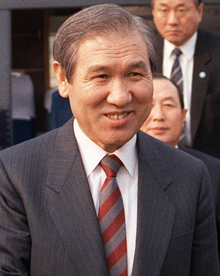- Roh Tae-woo
-
Roh Tae-woo
노태우
盧泰愚
In 1989 13th President of South Korea In office
25 February 1988 – 25 February 1993Prime Minister Lee Hyun Jae
Kang Young Hoon
Roh Jai Bong
Shin Hyon Hwak
Chung Won Shik
Hyun Soong JongPreceded by Chun Doo-hwan Succeeded by Kim Young-sam Personal details Born December 4, 1932
Daegu,
Gyeongsangbuk-do, Colonial Korea
(now South Korea)Nationality Korean Political party Democratic Justice Spouse(s) Kim Ok-suk Religion Buddhism[1] Military service Service/branch Republic of Korea Army Rank General Korean name Hangul 노태우 Hanja 盧泰愚 Revised Romanization No Tae-u McCune–Reischauer No T'aeu Pen name Hangul 용당 Hanja 庸堂 Revised Romanization Yongdang McCune–Reischauer Yongdang Roh Tae-woo (Korean pronunciation: [no tʰɛ.u]; born December 4, 1932 in Daegu, South Korea), is a former ROK Army general and politician. He was the 13th president of South Korea (1988–1993).
Roh befriended Chun Doo-hwan while in high school in Daegu. In his younger life, Roh was a keen rugby union player.[2]
A member of the army from 1955, Roh rose steadily through the ranks and was promoted to major general in 1979. A member of the Hanahoe, a secret military group, he gave critical support to a coup later that year in which Chun became the de facto ruler of South Korea. Roh was a military general when he helped Chun lead troops to the Gwangju Democratization Movement in 1980.
Chun forced his way into the presidency years later when he retired from the army and Roh became a key official in Chun's government. Most notably, he oversaw preparations for the 1988 Summer Olympics in Seoul, which he officially declared open.
In June 1987, Chun named Roh as the presidential candidate of the ruling Democratic Justice Party. This was widely perceived as handing Roh the presidency,and triggered large pro-democracy rallies in Seoul and other cities in the 1987 June Democracy Movement.
In response, Roh made a speech on June 29 promising a wide program of reforms. Chief among them were a new, more democratic constitution and popular election of the president. In the election, the two leading opposition figures, Kim Young-sam and Kim Dae-jung (both of whom later became presidents), were unable to overcome their differences and split the vote. This enabled Roh to win by a narrow margin and become the country's first cleanly elected president.
Roh's rule was notable for hosting the Seoul Olympics in 1988 and for his foreign policy of nordpolitik, which represented a major break from previous administrations. True to his word, he remained committed to democratic reforms. He also meets President Corazon Aquino for a series of talks between the Philippines and South Korea for economic, social and cultural ties, supporting Filipino athlete Leopoldo Serantes in the Olympics, and to discuss Unification talks to end North Korea's hostilities after the Korean War.
In 1993, Roh's successor, Kim Young-sam, led an anti-corruption campaign that saw Roh and Chun Doo-hwan on trial for bribery. Ironically, Kim had merged his party with Roh's in a deal that enabled him to win election. The two former presidents were later separately charged with mutiny and treason for their roles in the 1979 coup and the 1980 Gwangju massacre.
Both were convicted in August 1996 of treason, mutiny and corruption; Chun was sentenced to death, later commuted to life imprisonment, while Roh's 22½-year jail sentence was reduced to 17 years on appeal. Both were released from prison in December 1997, pardoned by then-President Kim Young-sam.
See also
References
- ^ (Korean) Hani News The Hankyoreh(2008-09-03). Retrieved on 2008-09-13
- ^ Famous Ruggers by Wes Clark and others, retrieved 19 August 2009
Political offices Preceded by
Chun Doo-hwanPresident of South Korea
1988–1993Succeeded by
Kim Young-samPresidents of South Korea (List)  Syngman Rhee · Heo Jeong (acting) · Yun Bo-seon · Park Chung-hee · Choi Kyu-hah · Chun Doo-hwan · Roh Tae-woo · Kim Young-sam · Kim Dae-jung · Roh Moo-hyun · Goh Kun (acting) · Roh Moo-hyun · Lee Myung-bak
Syngman Rhee · Heo Jeong (acting) · Yun Bo-seon · Park Chung-hee · Choi Kyu-hah · Chun Doo-hwan · Roh Tae-woo · Kim Young-sam · Kim Dae-jung · Roh Moo-hyun · Goh Kun (acting) · Roh Moo-hyun · Lee Myung-bak Categories:
Categories:- South Korean military personnel
- Presidents of South Korea
- South Korean criminals
- Knights Grand Cross of the Order of St Michael and St George
- South Korean Buddhists
- 1932 births
- Living people
- People from Daegu
- Recipients of South Korean presidential pardons
- Democratic Justice Party politicians
- South Korean anti-communists
- People of the Vietnam War
Wikimedia Foundation. 2010.
